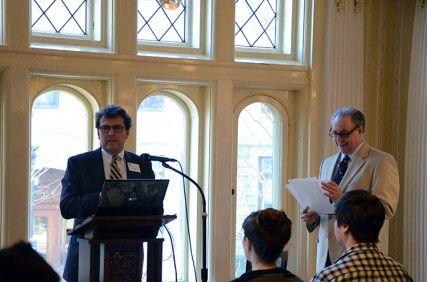
The Boston University College of Communication Division of Emerging Media Studies hosted a reception to celebrate the launch of the new Center for Mobile Communication Studies Wednesday night at the BU Castle.
James Katz, a professor of emerging media in COM and the director of the center, hosted the event and emphasized the use, impact and consequences of mobile devices on communication.
“The core focus [of the center] is on mediated communication and understanding how people use technology and the consequences of doing so,” Katz said. “Based on that information, we are supporting the educational initiative of BU and the advancement of human behavior in an exciting new realm.”
In addition to research on selfies, Skype and Snapchat, the center will offer courses and consult with on-campus programs concerning mobile technology solutions, said Katz.
“Mobility is quite unique because in earlier eras nobody had it,” he said. “Emerging media is happening everywhere, and it’s useful to have an organized thesis to attack problems and give focus to mobile communication studies.”
About 50 students, faculty and professionals attended the launch. The reception featured presentations from mobile communication experts Ronald Rice and Scott Campbell and allowed for networking opportunities for attendees.
Rice, a professor and the department chair of communication at the University of California Santa Barbara, said that the history of communication and technology is crucial to researching mobile communication in a contemporary setting.
“Mobile phones are a place of multiple mediums and also a source of a wide range of research that allows us to study pretty much everything,” he said. “To put things in perspective, it is not the first time that [something like this] has happened. Also, all we know about old media gives us tools to analyze new media.”
Campbell, an associate professor of communication studies at the University of Michigan, said he is interested in the distinction between mobility and portability when it comes to communication devices.
“People write and theorize, and mobile gets lumped in with laptops, tablets and sometimes PCs,” he said. “I think that there are really important differences between the ability to weave the flows of information and communication into your everyday life activities as you’re conducting those activities. I think that is socially consequential in different ways than taking a device and carrying it around, setting it down and using it while you’re tethered to a place.”
Several students who attended the launch said they learned from the speakers and are eager to see how the Center for Mobile Communication Studies develops.
Kayla Cohen, a COM freshman, said she never noticed how prominent phone use is in communication as opposed to different forms of technology to access the Internet.
“Nobody really thinks of a phone as more than a cellular device,” she said. “The Center for Mobile Communication Studies accentuates the importance of phones in such a big way, and I’m interested to see what they come up with.”
COM freshman Brooke White said she thinks mobile devices can have an impact on how people share and access information.
“Everyone has access to post and receive information, which is the idea of citizen journalism,” she said. “I think that mobile media might take away from journalism.”
Sarah Braunstein, a junior in COM, said the center is an exemplary way for BU to maintain its place on the cutting edge of communication research.
“It’s a really good idea that builds upon COM,” she said. “Communication is always changing, and BU notices the significance of mobile communication. It’s important to keep up, and the center will help draw people to BU.”















































































































